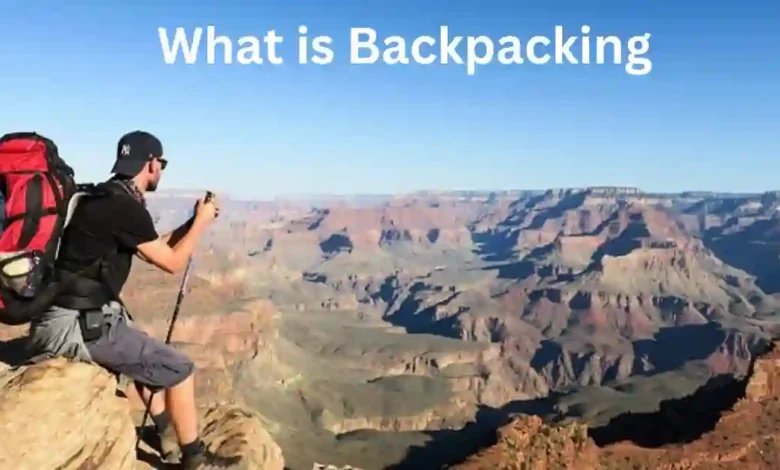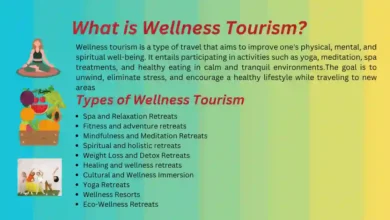
What is Backpacking?
Traveling with your entire world on your back may seem like a risky undertaking, but that is exactly the appeal of backpacking. In this article we examine the fundamentals of backpacking, revealing its many variations, highlighting its benefits and drawbacks, and examining the various reasons why people choose to engage in this unusual kind of travel. Join us as we explore the purpose, variety, and attraction of backpacking, whether you’re seeking adventure, enjoying nature, or seeking personal development.
Backpacking
It is a mode of travel or outdoor leisure in which people carry all of their essentials, such as clothing, food, and shelter, in a backpack while traveling to new places, frequently in isolated or wild settings. It is a type of independent and self-sufficient travel that enables people to discover new cultures, immerse themselves in nature, and frequently partake in outdoor activities like hiking, camping, and trekking.
Types of Backpacking
There are many various experiences and styles of backpacking, each of which caters to distinct preferences and interests. Some of the types are as under:
Urban Backpacking
Going on a backpacking trip doesn’t always entail entering a remote area. metropolitan travelers frequently stay in hostels or other inexpensive lodgings as they explore cities and metropolitan areas on foot. They concentrate on city attractions, historical landmarks, and cultural events.
Adventure Backpacking
Adventure backpackers mix traditional backpacking with outdoor pursuits like rock climbing, kayaking, or mountain riding. These excursions mix natural exploration with heart-pounding thrills.
Long-Term Backpacking
Some people decide to go on lengthy backpacking excursions lasting several months to a year or more. They might cross continents in search of various cultures, settings, and adventures.
Service or Volunteering Backpacking
Travelers who backpack can include volunteer work or community involvement. While traveling and seeing new locations, this style of backpacking enables individuals to support local charities and environmental causes.
Flashpacking
This more recent term describes a combination of luxury vacation and backpacking. Flashpackers preserve a flexible and independent travel style while utilizing contemporary technologies and possibly splurging on certain creature pleasures.
Hiking Backpacking
This is one of the most common forms, where individuals explore trails, forests, mountains, and other natural landscapes on foot. Hiking backpackers often carry camping gear and supplies, and they may stay overnight in tents or shelters along the way.
Thru-Hiking
A long-distance path is traversed in its entirety in a single, continuous trip when your thru-hike. Famous examples include the Appalachian Trail (USA), Pacific Crest Trail (USA), and Camino de Santiago (Spain). Thru-hiking requires significant planning, endurance, and time commitment.
Ultralight Backpacking
Backpackers who travel ultralight put special emphasis on reducing the weight of their equipment and using a minimal amount of it. They often use high-tech, lightweight equipment to reduce the load they carry while still maintaining safety and comfort.
Wilderness Backpacking
This type of backpacking takes place in remote and undeveloped areas, often requiring navigation and survival skills. Wilderness backpackers seek solitude, connection with nature, and the challenge of self-sufficiency in rugged environments.
Cultural Backpacking
This form of backpacking emphasizes immersing oneself in local cultures, traditions, and communities. Travelers interact with locals, learn about customs, and participate in traditional activities.
Pros and Cons of Backpacking
Backpacking, as an adventurous and budget-friendly style of travel, comes with its own set of pros and cons. Here’s a breakdown of some of the advantages and disadvantages of backpacking.
Pros :
Cost-Effective
This is often more affordable than traditional forms of travel, as it involves budget accommodations, cooking meals, and using public transportation.
Flexibility
Backpackers have the freedom to adjust their itineraries, stay longer in places they enjoy, and explore off-the-beaten-path destinations.
Cultural Immersion
Backpackers often have more opportunities to interact with locals, learn about their cultures, and gain authentic experiences.
Adventure and Exploration
It allows individuals to venture into remote and less-touristy areas, offering a sense of adventure and discovery.
Personal Growth
Overcoming challenges, navigating new environments, and adapting to unfamiliar situations can lead to personal growth and increased self-confidence.
Minimalist Lifestyle
It promotes a minimalist lifestyle, where individuals learn to live with fewer possessions and appreciate simple pleasures.
Connection to Nature
Many backpacking trips involve spending time outdoors, which fosters a deeper connection to nature and offers a break from urban life.
Cons :
Uncertainty and Risk
It can involve unpredictability, such as changes in weather, transportation disruptions, and safety concerns.
Physical Demands
Carrying a heavy backpack, hiking, and navigating unfamiliar terrain can be physically demanding, especially for those not accustomed to such activities.
Lack of Comfort
Budget accommodations and basic amenities might mean sacrificing comfort and convenience.
Loneliness and Isolation
Traveling solo or in small groups might lead to feelings of loneliness, especially in remote areas.
Limited Privacy
Shared dormitories, communal facilities, and crowded transportation can limit personal privacy.
Cultural and Language Barriers
Communicating in foreign languages and navigating cultural differences can be challenging and sometimes frustrating.
Health and Safety
Backpackers may be exposed to different health risks, from foodborne illnesses to insect-borne diseases, and might not have access to immediate medical care.
Logistical Challenges
Planning routes, accommodations, transportation, and budgets require careful preparation and research.
Environmental Impact
Over-tourism and improper waste disposal in some popular backpacking destinations can contribute to environmental degradation.
Purpose of Backpacking
The purpose of backpacking can vary from person to person, but generally, it involves traveling, often on foot, with all your belongings carried in a backpack. It is often associated with outdoor adventures, exploration, and self-discovery. Here are some common purposes and motivations for backpacking:
Adventure and Exploration
Many people engage in backpacking to explore new places, immerse themselves in different cultures, and experience the natural beauty of various landscapes. It allows individuals to venture off the beaten path, discover hidden gems, and engage in activities like hiking, camping, and trekking.
Connection with Nature
It offers an opportunity to connect with nature more profoundly. Spending extended periods outdoors allows backpackers to appreciate the beauty of the wilderness, observe wildlife, and enjoy the tranquility of remote areas.
Personal Growth
Backpacking often presents challenges that require problem-solving, adaptability, and self-reliance. Overcoming obstacles such as difficult terrain, adverse weather conditions, and limited resources can lead to personal growth, increased self-confidence, and a sense of accomplishment.
Escape and Relaxation
For some, backpacking provides an escape from the stresses and routines of everyday life. Disconnecting from technology and modern conveniences can lead to relaxation, mindfulness, and a break from the fast-paced world.
Social Interaction
It can be a social activity, allowing individuals to meet like-minded travelers from different backgrounds and cultures. Sharing experiences, stories, and challenges with fellow backpackers can lead to meaningful connections and friendships.
Challenge and Achievement
Setting out on a backpacking journey, especially in remote or rugged areas, can be a personal challenge. Completing a long-distance hike or reaching a specific destination can provide a sense of achievement and satisfaction.
Learning and Education
It often involves learning about the environment, geography, geology, history, and local cultures of the places visited. It provides an opportunity for informal education through firsthand experiences.
Minimalism and Self-Sufficiency
Backpackers must pack efficiently and carry only essential items, encouraging a minimalist lifestyle and teaching self-sufficiency and resourcefulness.
Environmental Awareness
Backpackers often develop a heightened awareness of environmental issues and conservation efforts. Experiencing pristine wilderness areas firsthand can foster a desire to protect and preserve natural landscapes.
Spiritual and Reflective Purposes
Some individuals embark on backpacking journeys as a means of seeking solitude, introspection, and spiritual connection. Being in nature can facilitate moments of self-reflection and contemplation.
Conclusion
Backpacking is an adventure journey that combines discovery, growth, and cultural interaction. It includes crazy challenges, urban adventures, and deep relationships. Although taxing, backpacking produces genuine experiences and a deep connection to both people and the natural world. It allows you to set out on a transformational journey that weaves tales and memories into the fabric of your life, whether you’re seeking excitement or solitude.
You may like:




